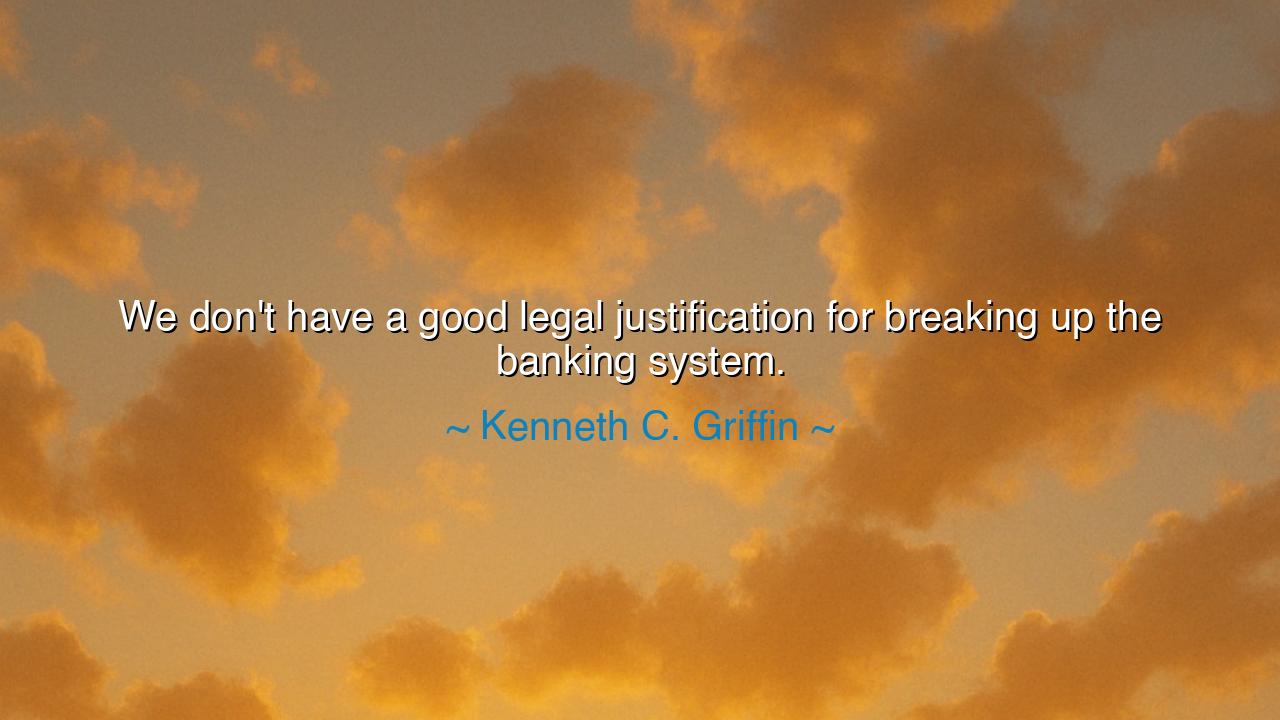
We don't have a good legal justification for breaking up the






The words of Kenneth C. Griffin, “We don’t have a good legal justification for breaking up the banking system,” echo with the weight of modern power — the quiet, invisible power that moves not armies, but economies. In these words lies a reflection of a truth as old as civilization itself: that wealth, once gathered into great institutions, becomes both a foundation and a fortress. Griffin’s words are not a cry for rebellion, but a statement of law and structure — a reminder that the pillars of finance, however flawed, are bound by the rules of man, and that the destruction of such pillars cannot be undertaken lightly, lest the roof of society itself collapse.
In the ancient world, the same question was asked in different tongues. Should power be dispersed or concentrated? Should the great engines of wealth be divided among the many, or entrusted to the few? In the age of Rome, this question wore the face of land rather than banks. Vast estates, owned by patricians, fed the city’s people — yet they also fed corruption and inequality. When reformers like Tiberius Gracchus sought to break up those holdings, they met not gratitude, but death. For whenever one seeks to divide the sources of power, even for justice, the guardians of that power rise like lions to defend their dominion. Griffin’s quote, though born in a different age, whispers the same truth: law alone cannot easily undo what time and greed have intertwined.
The banking system, as Griffin alludes, is not a mere machine of money but a living web — binding trade, government, and citizen alike. To “break it up” is to tear at the fabric of modern life. Yet his words also reveal an unease: if there is no legal justification for such action, it may be because the laws themselves were crafted to preserve, not to challenge, the giants they govern. The ancients would have called this the paradox of empire — that what sustains its strength also seeds its fragility. For the same institutions that guard prosperity can, in their excess, endanger the very people they were meant to serve.
Consider the story of the Great Depression in the 1930s, when unrestrained speculation and concentrated financial power brought ruin to millions. Banks fell, homes were lost, and hope itself seemed bankrupt. Out of that ruin arose reformers — among them President Franklin D. Roosevelt, who through the Glass-Steagall Act sought to separate commercial banks from investment banks, to curb the greed that had devoured trust. That act was, in its time, a moral necessity. Yet decades later, the tide reversed, the walls came down, and the same concentration of financial might reemerged, more complex and untouchable than before. Thus history, like a wheel, turned again to Griffin’s assertion: that the law, once strong enough to divide, now bends to protect.
But behind Griffin’s pragmatic tone lies a larger truth — that law and morality are not always twins. What cannot be justified legally may still cry out for moral reckoning. The ancients knew that when the law serves power and not virtue, it ceases to be just. The same may be said of a financial system so vast that it lives beyond consequence — “too big to fail,” and thus too sacred to question. The absence of a “legal justification” is not the end of the conversation, but its beginning. For laws are not eternal; they are living instruments, meant to evolve as justice demands. And when they grow too rigid, the people’s will becomes the forge that reshapes them.
Therefore, let the listener take heed: stability is not the same as justice, and legality is not the same as righteousness. To preserve what exists simply because it exists is the path of decay. To destroy without wisdom is the path of chaos. The wise path lies between — in the renewal of law, the balancing of power, and the courage to hold the mighty accountable without burning the foundation beneath us.
So remember this teaching: the banking system, like any creation of humankind, must serve the people, not rule them. Question the structures of power, not with anger, but with understanding. Study how wealth moves, how laws shape it, and how morality should guide it. Let your voice join the chorus of those who seek reform, not ruin — evolution, not destruction. For the health of a nation is not measured by the strength of its banks, but by the justice with which its wealth is shared, and the wisdom with which it governs those who guard it.






AAdministratorAdministrator
Welcome, honored guests. Please leave a comment, we will respond soon